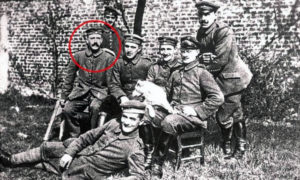Adolf Hitler would look considerably different 20 years later.
In March 1917, Hitler returned with his unit to the regimental barracks. Shortly afterwards, List’s men witnessed the heavy Canadian attack on the Vimy Ridge. And then they were directly confronted by fierce British attacks during the Battle of Arras. Then, in the late summer of 1917, the List Regiment returned to Geluveld for the Third Battle of Ypres, during which it was brutally pounded by British artillery for over a week. The combination of high explosives, shrapnel and gas caused terrible casualties. Hitler was directly involved in the fighting, as his regiment’s barracks stood in the way of the British advance towards the Ypres salient.
Meanwhile, the United States entered the war on the side of the Allies in early April 1917. This decision was seen by many on both sides of the Atlantic as an act of Anglo-Saxon solidarity directed against the Teutons. Millions of Americans, many of them foreign-born, prepared to cross the Atlantic.
The List Regiment was deployed to support the major German offensive in the spring of 1918. In late March, while advancing just behind the assault troops, they encountered French soldiers from the colonies, Algerian Zouaves. Then, in mid-1918, the List Regiment encountered Americans for the first time, at the Second Battle of the Marne near Reims. Here they were forced to retreat quickly, but not without taking some prisoners. Two of them were taken by Hitler to the brigade barracks.
Colin Ross, who would later advise Hitler on the United States, and who was then serving on the western front, remembers not only the courage of the American soldiers, but also their frequent calling out to each other in German and the large number of German-speaking prisoners.
By now, the Allied blockade, control of the sky and numerical superiority were beginning irreversibly to wear down Hitler’s regiment.
The German offensive was running out of steam in the face of overwhelming Allied superiority in manpower, material and energy. General Ludendorff famously spoke at the time of ‘the black days of the German army’. Although Hitler was again decorated in August 1918, this time with the Iron Cross First Class, German morale collapsed under the heavy bombardment. One report lamented that ‘enemy aircraft completely controls the skies’.
The growing wave of American soldiers arriving throughout September exacerbated the general feeling of despondency. Since October, more than half a million rested Americans entered the war and Africa, Australia, India and Canada continued to send whole units of soldiers to Europe.
After more than four years of war, the List Regiment had had enough. In mid-October, Hitler was wounded in a gas attack during a British bombing raid. A week later, he was sent to the Prussian Reserve Hospital northeast of Berlin. There he learned of the Armistice and the German surrender on 11 November 1918. Thus ended Hitler’s four-plus years of war.
Above all, Hitler had come away from the war with a keen sense of power of the Entente, especially the British, in his eyes the most formidable of the ‘world of enemies’ against which he had battled in vain those four years…
In short, by the end of the war, Hitler had the ‘world of enemies’ firmly in his sights. The struggle against the Jews, in their capitalist or communist guises, had not yet begun, however, and nor had he explicitly targeted the United States.

3 replies on “Hitler, 3”
It must have been truly demoralizing for them to see how many Germans were serving as part of the invading Anglo forces. To turn brothers against each other, which is very much how the English make war.
I suppose this is what Knut Hamsun was referring to when he said that every non Anglo immigrant to the states was socially bullied into learning English and forget his mother language in order to have a small share of “the American dream”.
Did they ever hesitated about the idea of invading their own homeland?
Were they that eager to defend Britain? As any good “Anglo” American should do.
Or were they just simply following the trend in order to look like good obedient Americans and avoid persecution in the new world?
Funny, the sons of these men (now impoverished after the great depression) will later invade Germany again only to realize how rich those “filthy Natzis” were.
Hitler’s First World War years never cease to amaze me. After reading Jünger’s brutal account of the war, The Storm of Steel, it is always a great motivator for me to think of Hitler in those trenches and to know that he came out of there alive with that experience and created a magnificent Aryan state.
I think I recommended this before, but there is a documentary about Hitler’s war years that I like: Hitler The Unknown Soldier. It’s on Youtube.
Hitler had a son in France with a French woman in the occupied zones while he was on duty there. This came out in 2005 or 2006 when the various children of the son did genetic testing to try to find out who their unknown grandfather was (the grandmother had only ever said it had been a German soldier who had always been very kind to her). The Daily Mail had several stories on it, with the last one being that they were requesting privacy from the media because they didn’t want their farms turned into neo-nazi shrines. The story never got mentioned again, anywhere.